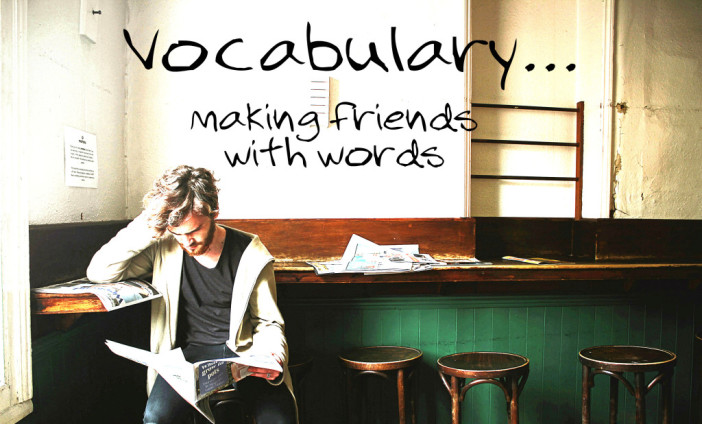Vocabulary … making friends with words
Everyone learning a new language wants, and needs to, acquire new words. Words are the building blocks of our language. Without improving your vocabulary, you won’t be able to read, write, speak, or understand what you hear.
Given that learning new words is essential, how do we do this efficiently and effectively? In the next few posts, I’ll be discussing various aspects of mastering vocabulary. And I need to give a shout-out right now to Professor Kevin Flanigan, who teaches a course on vocabulary with Great Courses Plus and who has been inspiring me with new ideas during each lecture he gives.
First of all, it’s helpful to think about new words as if they were strangers who eventually become friends. By understanding this concept, you realize that learning a new vocabulary word isn’t a you-either-know-it-or-you-don’t situation. Our familiarity with words grows over time, just like a friendship.
Think about it this way. When you first encounter a new word in English, it’s like meeting someone for the first time. You might figure out a few things about this person from the people around him, or make some guesses about her based on what she’s wearing, but basically this is a stranger. Same with new words. We look at the context surrounding the word, notice things like whether it ends with an – ing or an – s, but we don’t really know what the word means.
However, if we spend time with this word, if we keep meeting up with it, and if we pay attention to it when we meet it in various settings, it’s like that person you keep running into at the bus-stop or your university class. The word is no longer a stranger. You know some things about it.
Finally, you make friends with that word. By encountering it enough times, or by looking it up in a dictionary, you feel more and more confident that you know what it means. And finally, you’re ready to actually use it – in writing or in speech. If it’s a best friend, you’ll even use it without needing to run it through that mental translator in your head: the one that takes words in your native language and processes them into English before you write or speak.
To help quantify your understanding of a particular word, you can use this scale developed by Edgar Dale, an educational researcher. From 1 to 4, he ranks vocabulary knowledge like this:
- I do not know the word, and I have never seen it before.
- I’ve heard of the word before, but I’m not sure what it means.
- I know the word and can recognize and understand it while reading, but I probably wouldn’t feel comfortable using it in writing or speech.
- I know the word well and can use it in writing and speaking.
In my next blog post, I’d like to discuss how to choose your friends in the first place. How do you most effectively select the right words to get to know? After that, I’ll offer four really helpful steps to help you move from 1 to 4 on the familiarity scale and turn strange words into friends.





August 26, 2017 @ 7:50 pm
I like everything I just read and all details included, I’m we can work together to help me improve my reading skills. Thank you so
Much for introducing this new method of exploring new vocabulary experience.